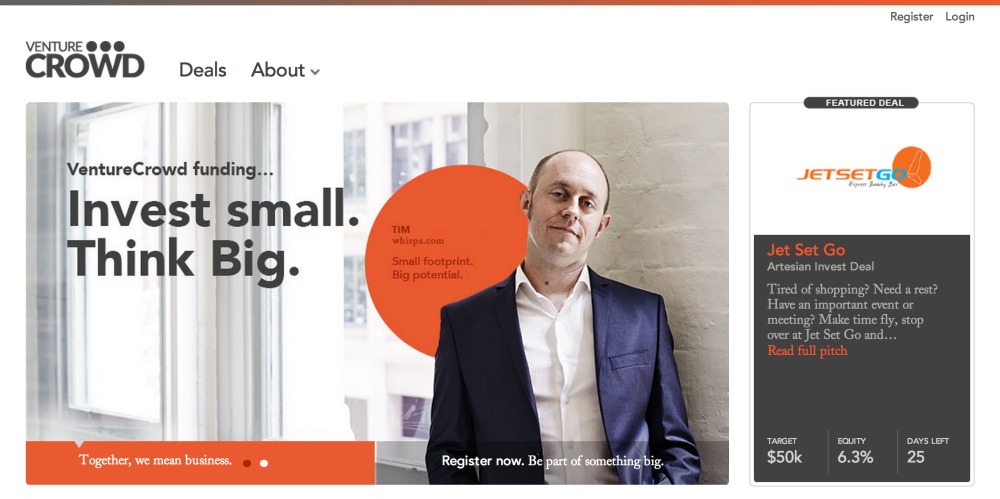
VentureCrowd
Pitch your Startup, App or Hardware or post a Startup Event or Startup Job
Ed: Andrew “Wardy” Ward a regular contributor to Startup88 has been pushing Australia’s regulators to adopt Equity Crowdfunding for over two years, has made numerous submissions to CAMAC and regularly arranges roundtables to discuss crowdfunding.
Yesterday he sat down with Dean McEvoy, Chris Clark from Fusesport, Robert Knight from Allens and Rachel Bui from Muru-D to discuss the recommendations.
After 2 years of consultation, first via the Corporate and Markets Advisory Commission (CAMAC) and now via Treasury it looks like Crowd Sourced Equity Funding is set to introduced to Australia in time for the new financial year.
The two policy options that Treasury are considering would cap the amount raised to within $2 million dollars within any 12-month period.
The legislative framework option is to copy New Zealand, which has had legislation running since April 2014. The second option is to adopt the recommendations made by CAMAC in June 2014 shortly before being wound up as part of budget cuts.
These frameworks share a lot in common including putting the gatekeeper role squarely in the hands of the Intermediaries.
Intermediaries will be web-based platforms given a License from the Regulator. In Australia they would also hold an AFSL. Intermediaries at the very early stage of a business must conduct due diligence and enforce investor caps if these end up being part of the policy mix.
As with any new financial product available to retail investors getting the balance between regulatory requirements and low-cost participation is causing most of the tension.
The industry clearly sees the need to keep unethical or dodgy listings from defrauding the investors but suggests that investors must also maintain a ‘buyer beware’ mentality as investing in business equity is inherently risky.
Government caps on investors or issuers is unlikely to make anyone happy.
The industry feels that the wisdom of the crowd, which has proven exceptionally good within the rewards crowdfunding space at weeding out fraud would also be effective at policing equity crowd funding. (Ed: Not sure I 100% agree with this, there have been some shockers recently in US particularly hardware devices which just don’t seem to turn up or are clearly not deliverable)
Low rates of fraud in overseas markets that have been operating for some years is usually attributed to the time, expense and complexity of creating, marketing and managing a campaign. Con artists would probably look for easier less public ways to make money.
Treasury must determine the balance between investor protection and market economics playing out.
In the end they can only guess and should probably take a mix from the CAMAC framework and the New Zealand framework so that we don’t go a further 12 months or more without analogous legislation to our trading partners like the UK, United States and New Zealand.
Below are listed the key differences between the CAMAC and New Zealand frameworks.
CAMAC recommends the creation of a new corporate form an “exempt public company”. This form is exempt from regulatory burdens like audits and annual meetings unless the business “graduates” by crossing a capital or revenue threshold. New Zealand does not distinguish between public and proprietary limited companies the way Australia does and so CSEF legislation is open to all existing businesses with reporting increasing with size.
CAMAC limits fees and excludes equity participation for Intermediaries in Issues that are advertised on their platform, New Zealand does not.
CAMAC requires all Intermediaries to hold an AFSL. New Zealand doesn’t specify this requirement.
New Zealand has no investor caps leaving the retail investor to decide their own risk profile. New Zealand makes disclosure documents a requirement of all companies whilst CAMAC proposes template-driven generic warnings.
To see the full treasury discussion paper
Want to contribute to the CSEF Discussion in Australia?
There is currently a national survey underway to respond to the CSEF discussion paper – co-ordinated by the Crowd Funding Institute of Australia (CFIA).
http://goo.gl/forms/kqei3dpaEX
An amalgamated anonymous dataset to help inform responses will be created.
You can find out more here
The Website: www.cfinstitute.org
LinkedIn: http://www.linkedin.com/groups/Crowd-Funding-Institute-Australia-6790118
Pitch your Startup, App or Hardware or post a Startup Event or Startup Job